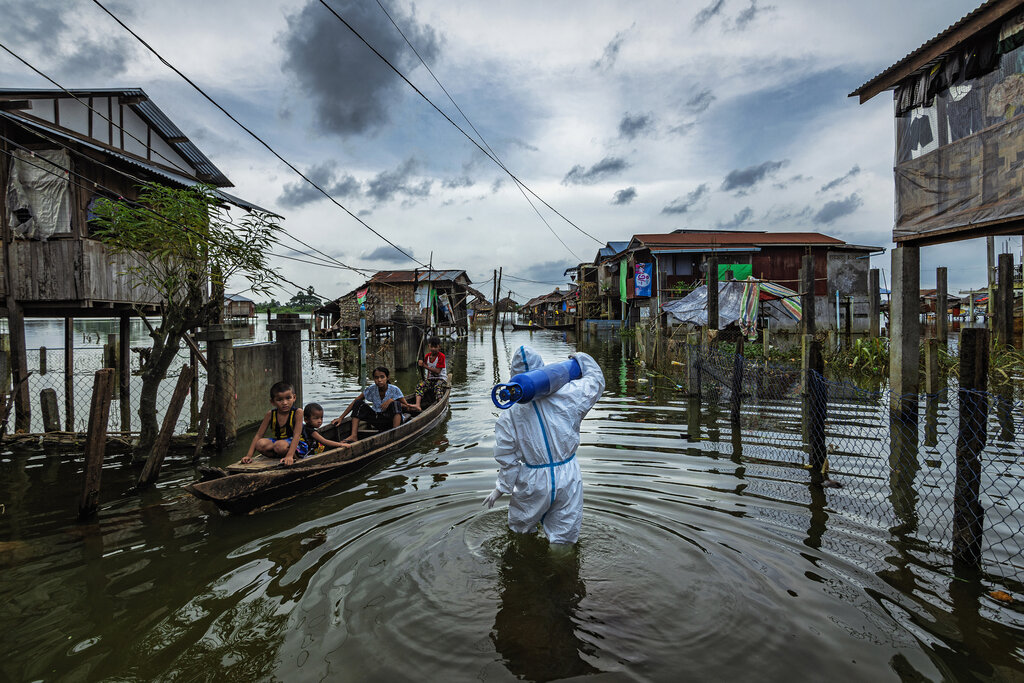Climate change indicators measuring the health of the planet found greenhouse gas concentrations, sea level rise, ocean heat and acidification have all broken records last year.
—
Humanity’s over-reliance on fossil fuels and ecological damage has released historic levels of greenhouse gases to the point that four critical indicators of climate change broke records in 2021, according to a new report by the UN’s World Meteorological Organization (WMO).
The world smashed records for all global indicators: greenhouse gas concentrations, sea level rise, ocean temperatures and acidification. Carbon dioxide and methane – a potent planet-warming gas – emissions have soared to unprecedented levels in 2021 despite worldwide pandemic lockdowns and travel restrictions, the State of the Global Climate in 2021 report found. CO2 concentration has also reached 50% higher than pre-industrial levels.
Rapidly increasing global temperatures are accelerating glaciers and sea ice to melt with sea levels rising at dangerously fast rates. In 2021, global average sea levels were at a new high, rising 100mm on average since 1993, or increasing at a rate of 4.5mm a year, which is more than double the rate they were 20 years ago of 2.1mm a year.
Oceans are one of the world’s important carbon sinks and were found to have absorbed almost a quarter of global carbon emissions. But in doing so, they’re becoming increasingly more acidic, which aggravates physiological stresses and reduces growth and survival rates of many marine species. This in turn, affects marine ecosystem services and food security. The report says that the ocean is now the most acidic it has ever been for 26,000 years.
Aside from intaking carbon, the oceans also absorb more than 90% of the heat trapped by greenhouse gases, causing marine temperatures to sharply rise over the past 20 years and setting a new record in 2021. The year also saw much of the ocean experiencing at least one strong marine heatwave.
You might also like: How Does Climate Change Affect the Ocean?
Together, these climate change indicators are all clear signs of humanity’s impact on the planet, which is bringing long-lasting and likely irreversible effects.
“Today’s State of the Climate report is a dismal litany of humanity’s failure to tackle climate disruption. Fossil fuels are a dead end – environmentally and economically,” said UN secretary general António Guterres.
The UN report revealed the past seven years have been the hottest on record. With hotter average temperatures come more extreme heat waves and weather events such as storms, floods and droughts. The consequences of which include higher mortality rates and global food insecurity.
“Extreme weather has the most immediate impact on our daily lives,” said Professor Petteri Taalas, the WMO secretary general. “We are seeing a drought emergency unfolding in the Horn of Africa, recent deadly flooding in South Africa and the extreme heat in India and Pakistan. Early warning systems are critically required [to save lives] yet these are only available in less than half of WMO’s 187 member nations.”
In 2015, world leaders signed the Paris Agreement to cap global warming to at least 1.5C (and no more than 2C) above pre-industrial levels by 2030. However, the planet was 1.1C hotter in 2021 and scientists expect the 1.5 C threshold will likely be crossed in a decade.
The UN is once again urging for the immediate end of fossil fuel production and consumption, starting with coal. Due to the war in Ukraine, a number of nations have seen an uptake of coal to reduce dependence on Russian oil and gas supplies.
“The only sustainable future is a renewable one,” Guterres states.“ The good news is that the lifeline is right in front of us. Wind and solar are readily available and, in most cases, cheaper than coal and other fossil fuels. If we act together, the renewable energy transformation can be the peace project of the 21st century.”
Taalas also calls for the end of deforestation in tropical rainforests – deforestation accounts for at least 10% of global anthropogenic carbon emissions – and greater adoption of more vegetarian and plant-based diets to help protect those forests. A recent study found that swapping 20% of global beef consumption with meat substitutes could halve deforestation.
EO’s Position: The report clearly shows that the world is rapidly losing sight of being able to stay under the 1.5C limit of global temperature rise. We need to phase out fossil fuels immediately and scale up renewable energy generation to avoid the catastrophic impacts of climate change. Governments must step up their climate action, stop fossil fuel investment and agricultural subsidies, and redirect them to renewables.
Featured image by: Aung Chan Thar


















